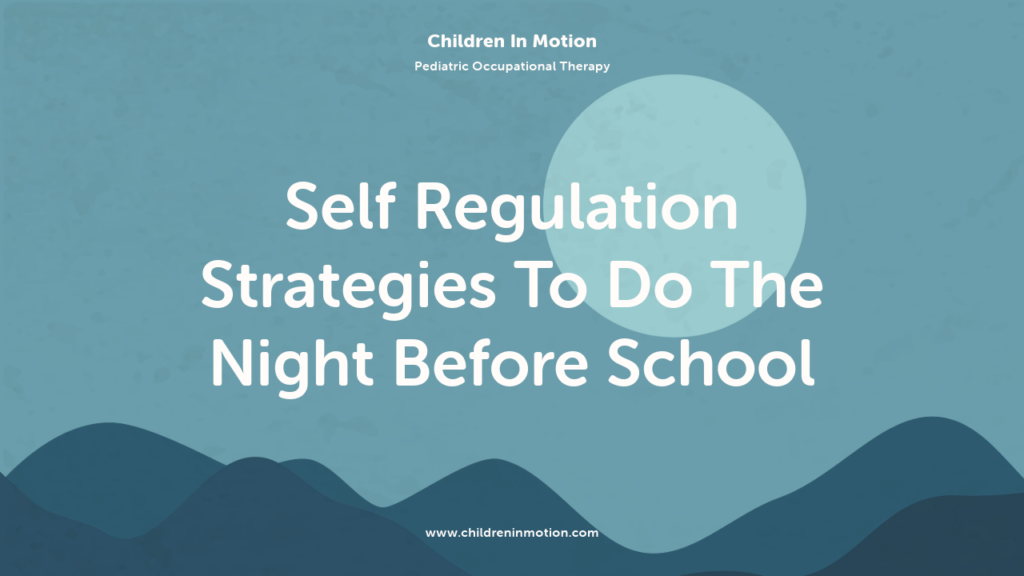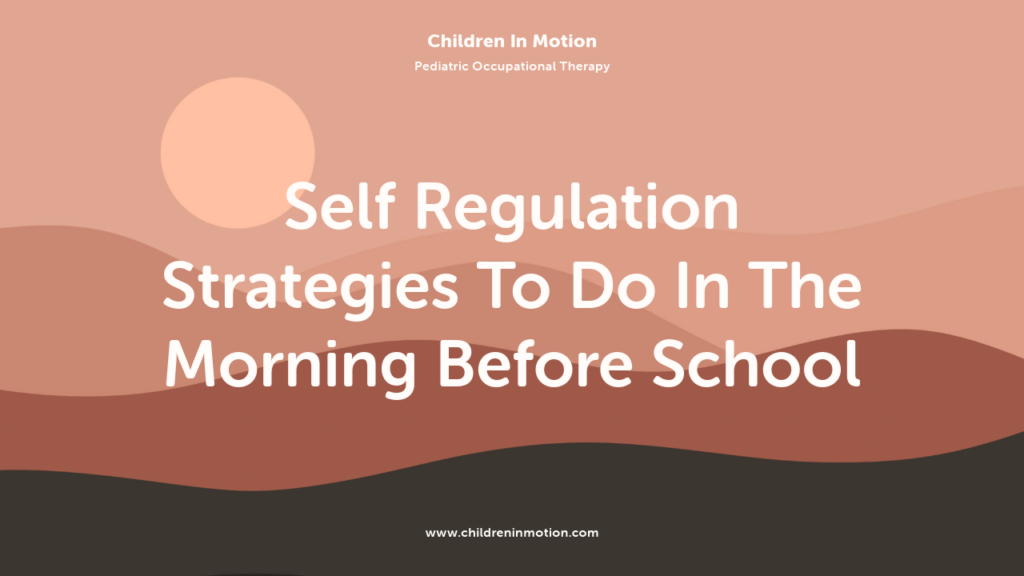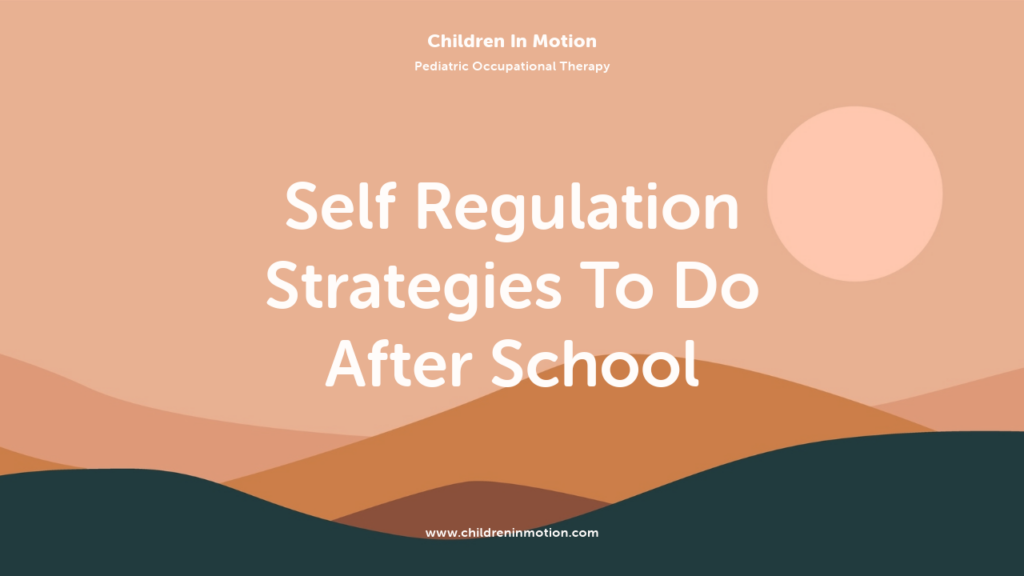Simple Self Regulation Strategies to Help The First Day Of School Go Smoothly
Does your child struggle to adjust to the school schedule after summer break? Transitioning from a looser, more relaxed summer schedule to a rigid school schedule can take some time to adjust to – and especially so if your child has a sensitive sensory system. To help your family adjust, here are a few simple self regulation strategies to use to help your child adjust to the new schedules and demands that come with the new school year.

Self Regulation Strategies for the Night Before School
The night before school can bring a lot of excitement and nervous energy, which can make falling asleep (and staying asleep) tough. To help your child get a good night of rest, we recommend getting a lot of really good muscle work throughout the day.
When my girls were young, the day before the first day of school we would always go to the pool. Swimming and playing in the pool requires a lot of muscle work. We would spend hours playing – diving for toys, playing imaginary games, jumping off the diving board, racing each other, playing water volleyball, etc. We would order pizza to eat at the pool so we could play until 7/7:30 at night.
It really was a lot of fun – and it wore my girls out! Once we got home we would take showers, get in bed and they would sleep great. This helped them get the rest they needed for a day full of new experiences at school.
A few other things that may be helpful to do the night before include picking out their clothes for the next day, packing their backpack & snacks/lunch, and putting together a visual schedule for them to follow in the morning.
Want To Learn More About Self Regulation?
We’ve created an introductory crash course that will help you understand your child’s behavior better as you begin to learn about self regulation. Plus we’ve included a tool for you to use that will help you identify patterns so you know exactly when to use self regulation strategies to improve your child’s behavior.

Self Regulation Strategies for the Morning Before School
Make sure you give your child plenty of time to wake up and get ready for school. Think of a reasonable amount of time, then add 15/20 minutes. Having to rush in the morning is a tough way to start the day, but for our sensory kiddos rushing can push them over the edge.
To start the process, diffuse essential oils (lemon, peppermint, or eucalyptus – try these!*) to wake up their olfactory system. Instead of immediately turning on their overhead lights, start with softer light. You can achieve this by opening their door and having the hallway light on, or turning on a lamp. It could also help to add some soft music to wake up their auditory system (check out this sunrise clock with music!)*.
Once they are awake, remind them of their visual schedule to guide their morning routine. Incorporate some morning muscle work to help wake up their brain & organize their system. This could look like doing morning stretches, doing animal walks or walking on stepping stones* to the bathroom or kitchen, jumping on the bed or onto crash pads*, or participating in a movement path* in the hallway. You can also get some muscle work in at breakfast by making them a smoothie to drink through a straw, or feeding them crunchy or chewy food (crunchy toast, chewy granola bar, crunchy nuts, chewy dried fruit).

Self Regulation Strategies for After School
When you pick them up from school or the bus stop, avoid asking them a bunch of questions. I know you want to know everything about their day – but a lot of questions can be overwhelming. Stick to one or two questions and if they need to just sit in silence, let them.
To help them decompress, recenter, and organize their brain, have them use their muscles. It is very important to prioritize muscle work after school. This could look like going outside to climb on the playset or up a tree, jumping on the trampoline, playing basketball or soccer, exploring in a sandbox, swinging, rollerblading, or drawing with chalk.
This will give their brain a break from all of the learning & stimulation from school. Utilizing a timer could also be helpful as you transition from muscle work (playing) to homework time or dinner (check out ‘Hatch Timer’ for a fun, add free timer to use on your phone).
Self Regulation Strategies for Homework Time
If your child has homework to do, mouth work is oftentimes helpful when transitioning from playing outdoors to homework. One way to get mouth work is by having a bowl on the table with gum or mints that your child can utilize to help them focus. You could also give them a crunchy or chewy snack, or give them something they can drink with a straw. These are great ways to activate the jaw muscles which will help with focus and attention.
Another way to get muscle work, and increase focus and attention for homework, is by utilizing alternative seating options. Instead of sitting at the table, could your child stand up to complete their work? Or sit on a yoga ball**? Could they lie on their stomach on the ground with a small pillow under their shoulders and work on the ground?
It could also be helpful to have a visual schedule for after school & evening routines to help them visualize what happens when. We also want to mention that it is important to make sure there is unstructured time in your child’s day. Not only is your child using a lot of energy throughout the day, but they are going going going. Make sure you don’t over schedule afternoon activities after school. Maybe have scheduled activities once or twice a week, but leave a few afternoons open for them to have time to themselves.
**(make sure their feet are flat on the ground and their knees are at a 90° angle)
Does your child struggle to sit at the table for homework or dinner?
You aren’t alone! This is a very common challenge that we hear from parents. We have a few easy ( & neuroaffirming) strategies for you to incorporate at home to help improve sit time at the table – download the strategies below!
One Last Self Regulation Strategy –
Don’t forget to breathe. Breathing is so important for our children, and for us! When you find yourself in the midst of a transition – getting ready to leave the house, before starting dinner, during homework, or before we go to bed – take a moment for some deep breaths. Deep breathing increases oxygen flow, works the muscles in our shoulders and chest, and releases all of the built up tension we hold throughout the day.
The transition from summer break to school is a big transition. Make sure you are filling up your cup so that you can be patient and flexible with your kiddos. Find time in your day to use your muscles, go to bed early (if you can), keep your dinners/meals simple, and breathe. For some families, it only takes a week to transition, but for others it can take longer – so keep an open mind and adjust your expectations as needed. Continue to prioritize muscle work as much as possible, and hang in there!
*affiliate link
Want to know more about sensory processing, self regulation, child development, & more? Our resource library is full of free crash courses, guides, and tools to help you understand more about your child & how you can support them outside of therapy.
Get your free resources!
show me the resources